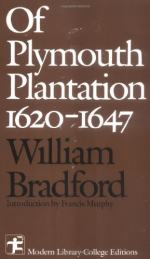
|
| Name: _________________________ | Period: ___________________ |
This test consists of 15 multiple choice questions and 5 short answer questions.
Multiple Choice Questions
1. Stone managed to get the governor of Virginia drunk and ended up absconding with _____ pounds worth of provisions.
(a) 750.
(b) 500.
(c) 1000.
(d) 300.
2. Weston's people objected not out of loyalty but out of fear of which of the following?
(a) Retribution.
(b) Starvation.
(c) Unemployment.
(d) Loss of Indian relations.
3. Who ordered Weston's arrest?
(a) Standish.
(b) Gorges.
(c) Bradford.
(d) Smith.
4. What was the rank of John Stone?
(a) Sergeant.
(b) Major.
(c) Captain.
(d) General.
5. Plymouth Plantation flourished. People began to spread out and soon it became necessary for the people to start their own ____.
(a) Congregations.
(b) Communities.
(c) Government.
(d) Colonies.
6. On what date did the shipwreck occur?
(a) February 13.
(b) May 1.
(c) March 6.
(d) April 10.
7. The population led to an excess of corn and ____.
(a) Barley.
(b) Cattle.
(c) Dairy products.
(d) Wheat.
8. Bradford details the shipwreck of which vessel?
(a) Edmund Fitzgerald.
(b) Mayflower.
(c) Little James.
(d) Anne.
9. Bradford details the trade activities that took place on which river:
(a) Connecticut.
(b) Delaware.
(c) Potomac.
(d) Charles.
10. In the end, Allerton ended up _____ the majority of the items that did not belong to him.
(a) Selling.
(b) Keeping.
(c) Trading.
(d) Squandering.
11. It was discovered afterward that the locusts had nothing to do with the deaths, that the deaths were actually caused by which of the following:
(a) Smallpox.
(b) Diptheria.
(c) Cholera.
(d) Consumption.
12. Despite the man's trickery Bradford was still considered to be a savvy ____.
(a) Politician.
(b) Leader.
(c) Mediator.
(d) Tradesman.
13. Allerton is referred to as being a _____ and unscrupulous man.
(a) Clever.
(b) Wicked.
(c) Devious.
(d) Cunning.
14. Weston made a deal with the colonist to take a number of what type of animal pelts to England?
(a) Fox.
(b) Bear.
(c) Deer.
(d) Beaver.
15. The majority of the letters were filled with _____.
(a) Complaints.
(b) News from home.
(c) Sorrow.
(d) People yearning for their loved ones.
Short Answer Questions
1. Bradford states that two of the saddest incidents during this time too place on the ______ and Connecticut Rivers.
2. Approximately how many people died from the epidemic?
3. There was a particularly large population growth in which area?
4. At what time of year did the Dutch retreat to the fort to secure trade?
5. Which is not one of the issues being suffered by the people of Plymouth Plantation at this time?
|
This section contains 355 words (approx. 2 pages at 300 words per page) |

|




